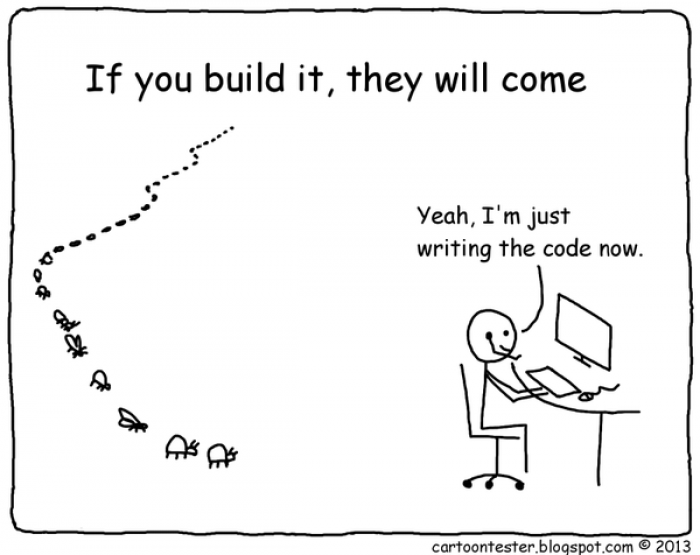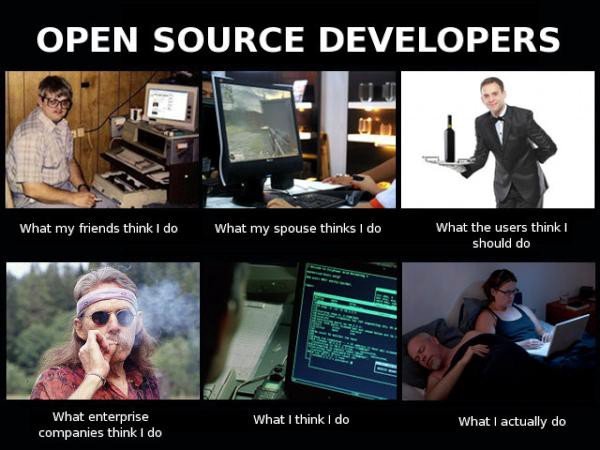Open Source Software (OSS) projects rarely have a marketing strategy or budget. There are many reasons for that and the majority are the result of misconceptions about what marketing actually is. The most common misconception I noticed among OSS project owners is that marketing is not something OSS needs mainly because it's free.
In this first post in a series about Marketing Open Source, I will dispel some myths about marketing and (hopefully ) give you a better understanding of its role in the success of your project.
Prologue
As many of you may have noticed, I've shifted my activity on the blockchain from blogging and writing to managing, reviewing, scoring, living and breathing @utopian-io . So you should not be surprised that this first post after over a week of silence is closely related to what I've been doing for most of my waking hours since you've heard from me last - everything and anything having to do with marketing open source projects, including Utopian itself.
It is my hope that this blog post series will bring value to the open source community, as well as help marketers understand how they can contribute to the success of their favorite open source projects.
1. Marketing = Sales
This misconception is common not only with OSS project owners, but also with your average mortal. It's important to understand that marketing is not sales. In fact, marketing is what makes sales possible and effective.

(via Pinterest and every inspiration marketing quote collection ever)
Now you might be thinking "But my product is free and so I don't need to sell it. Then why would I need marketing?" This bring me to the next misconception:
2. Free Stuff Doesn't Need Promotion
"If you build it, they will come." Many OSS developers believe it, but don't like to admit it. In the mind of a project owner, their product is the best thing since sliced bread. So naturally they assume that every human with an Internet connection and who needs the product will find it and use it because it's FREE!
Unfortunately, this is not true and the main reason OSS projects need a marketer aboard. Creating a product that is awesome doesn't instantly make people aware of its existence.

(Bugs always show up. People need to be invited.)
3. Marketing is Expensive
Many OSS project owners are driven away from talk of marketing or promoting due to lack of funding. Where would you get money to pay for services, ads and professionals to promote your project if it's free? Whatever donations you might be getting for your hard work can hardly cover the cost of a marketing agency. Not by a long shot.

The good news are that marketing is not as expensive as you think. In fact, many of the tools that will allow you to automate marketing activities are free (and open source!) and upkeep activities (to be discussed in later posts) don't cost anything at all.
Shameless plug ahead:
Some organizations, like Utopian.io, are looking to support and empower OSS projects from all angles. So in addition a community of developers and bug-hunters, on Utopian you can find professional marketers who can help you in prompting your project. With their skills and experience, they can get much better ROI on every cent invested, and get rewarded by Utopian for high-quality work.
4. The Community Promotes The Worthy
The ideal of decentralization and community collaboration is part of the open source philosophy. That said, a community cannot promote a product they do not understand or know of (yeah, that's a bit recursive). With marketing materials available (like landing pages and fun content to share) the community is more likely to take part in promoting your project.

5. Unfinished Projects Don't Need Promotion
The last misconception in this list relates to OSS projects that are a work in progress, pre-Alpha or even a white-paper with little to no code attached. It's easy to think that a project like that needs no visibility, at least at such an early stage.
This is a good time to remember we are still in the Open Source ecosystem, looking to decentralize development and attract quality contributions to our projects. And how will we do that? You guesses it - through marketing targeted at a specific audience: Open Source developers and entrepreneurs - just like you.
Epilogue:
As noted in the prologue, I hope this is the first part of a series. I don't promise regular posts because I can't predict my workload at Utopian. But as I work on marketing Utopian and helping project owners on Utopian optimize their marketing efforts, I hope to gain even more insights to share with you here.
I am looking forward to your comments, insights and suggestions in the comments!

Thanks for sharing your insights.
If we're talking about Steem, I don't know enough about the make-up of Steem Inc. to know how they feel about Steem as a business, but they are trying to promote it as a place of business - with SMTs.
@ned has said he's targeting hundred's of thousand of entrepreneurs building businesses on Steem, and of "tokenising the web". You don't do these things unless you promote the platform, or engage in some marketing.
I just feel that the Steem team need to bring in an outside voice - someone with experience of growing a social platform. I know that's easier said than done, but I hope they're trying.
The community will rally and promote Steem, but even then, some of their messages aren't the right ones to lead with. And you can't rely on the community, and word of mouth exclusively - I feel Steem needs more direction (in a non-technical sense - they're obviously on-point as far as the blockchain goes).
Well I don't know what Steem Inc is doing as well and just to tell an anecdote that Steem official Twitter account was not active and so was the other social media apps. It was of not getting the word out except through the word of mouth of its active users and some of the videos of Jerry Banfield.
Now some of the users banded together and thus the Promo-Steem movement was created.
Like techslut said here it is as if Steem inc just created it's tech and just expect people to jump on it because they were giving free money.
So that is why we have so many misinformation like Steemit is a ponzi or that it is easy to make money here.
steem could do better in marketing themselves or lose its first innovator advantage to new tech emerging.
I don't like to name names, but some of the people "promoting" Steem, in my view, are actually hurting its reputation. The "this is great, come earn lots of money" and "get rich quick" messages create an image problem.
I actually first found out about Steem through one of these "promotional" YouTube videos, and was initially put off the platform because of the hyper-snakeoil-salesman delivery.
That's the problem you have when the community is tasked with spreading the word - the word they spread might not be one you want spreading.
You had me rolling on the floor on this one. I agree it needs to be cohesive with the aims and philosophy of the company.
I work in company branding and the way Steem Inc is doing things honestly makes me scratch my head.
From what little I know, they really are.
Thanks for replying - and giving me a little renewed hope. The little you know is more than I do, so thanks for the update. Fingers crossed :)
DMed you on Discord. ;)
I absolutely agree - the main barrier to the expansion of steem, utopian and even open source is the lack of clear transmission of information to the wider world. 'The public' has been HEAVILY conditioned to expect (unconsciously) that 'big and flashy = best' and rather than questioning this, many simply go along with it all and thus never really look beneath the surface of the options that are available and hence.. facebook.
I used to think I hate marketing because I thought it was basically taking something that no-one wants and convincing them that they do want it.. However, that is only true of those who have no integrity or real wisdom (which sadly accounts for a large percentage of the 'business' world). It is entirely possible to market ethically and, in fact, I am currently working with one of the most successful 'new school' marketing companies at the moment with a client - they take almost dead business ideas and sometimes turn them into huge successes in a short space of time (months). I have been thinking about how to involve them with Steem and I am sure Utopian could benefit too. Their fee is actually quite affordable for such a project I think - alternatively though, I actually know enough to do it myself now, but a team of 5+ people is really needed to get that snowflake turned into an avalanche! ;)
Ah yes, you make a good point! Free doesn’t necessarily attract tons of people, because there are so many different options out there! People have to know more about an app or project to invest their time.
The very nature of free and open source software is based upon philosophy fundamental different to that of proprietary offerings in the market, i.e., it is not based on generating revenues and profits for it creators. Nevertheless, developers have to eat and pay their bills. And, quality software requires time and resources. So how can FOSS projects address the marketing challenge? Some of the best examples that readily come to mind are the KODI project, the home of the premier cross platform multi-media software, the Firefox browser from Mozilla, and VLC from the Video-LAN Project. Each of the project accept donations and in some cases even sell themed merchandise like t-shirts, coffee mugs, etc.
I can remember Mozilla placing an add for Firefox in a major newspaper some years ago but beyond that I believe that most FOSS projects have relied on word of mouth marketing or message boards for making their efforts known. However, with the rise of Steem and Steemit these projects have an opportunity to build direct relations to their user base. By communicating effectively and frequently with those users, developers can receive compensation through upvotes from the Steemit community. Therefore, the better the engagement with the community, the better the compensation for the projects. In the end, we all get to benefit from better software.
A good topic of discussion, thanks.
This is why I have utopian as one of my witness votes because of the value it brings in the community of open sourced programs and applications.
It is by rewarding and recognizing bug hunters, people who do howtos for open source, creating some engagement and recognition to these programs that will take Steem forward. Utopian is handling that right with more people working on utopian posts bringing to surface some great open source.
I agree with all of these things that you wrote. You don't write a lot but when you do it is something of importance and learning.
I can see utopian becoming better indeed with you onboard.
Now if only I can do utopian posts haha.
You really got a lot to offer us here. Such a reservoir of knowledge. I learnt a lot from this especially about marketing. I hope it pays off in the long run. I must confess your style of writing and presentation is unique too.
Thanks for sharing.
Thanks, very good explanation for why (OSS) projects need strategic marketing.
Good luck with your new activity at Utopian !